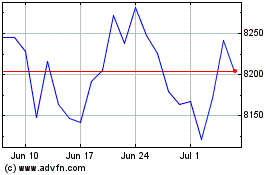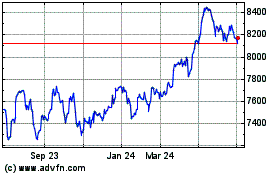Global Stocks Slip on Weak Economic Data
October 01 2019 - 9:08AM
Dow Jones News
By Max Bernhard
-- European stocks lower
-- Dollar flat against euro
-- Crude oil prices higher
Global stocks edged lower Tuesday, as manufacturing sentiment in
Europe fell to the lowest level in nearly seven years.
The Stoxx Europe 600 was down 0.3%, with Germany's DAX 0.1%
lower and the U.K.'s FTSE 100 down 0.1%.
Adding to the subdued outlook, the eurozone's annual rate of
inflation fell to 0.9% in September, its lowest level in almost
three years, data published Tuesday showed.
Futures on the S&P 500 inched up 0.2%, ahead of a key
indicator for U.S. factory activity, the Institute for Supply
Management's manufacturing index, which fell for the first time in
three years in August.
The ICE U.S. Dollar index, a measure of the dollar's level
against a basket of currencies, rose 0.1% to 99.58, its strongest
level since 2017. The euro was flat against the dollar after paring
earlier losses which had taken it near its weakest point since May
2017.
The latest eurozone manufacturing purchasing managers index data
dropped to 45.6 in September, its lowest level since 2012. The data
for September from Spain, Italy and Germany were all below 50,
indicating contraction.
The German PMI reading was weakest, hitting its lowest level
since the 2009 financial crisis.
The reading confirmed that "the eurozone's growth engine is
sputtering," said London Capital Group analyst Ipek
Ozkardeskaya.
Such economic shakiness means the European Central Bank "will
need to add more oil to the engine," and it will fuel expectations
of a more accommodative central-bank policy and increased downside
pressure on the euro, she added.
Weakness in the euro is a reflection of slower economic growth
in Europe compared with the U.S., combined with a sense among
investors that the ECB will have to be more aggressive than the
Federal Reserve to counteract a slowdown.
"Germany's overreliance on manufacturing has bode well through
eurozone expansion," but with the U.K.'s looming exit from the EU
and global trade tensions it makes sense the country is hit
hardest, said IG senior market analyst Joshua Mahony.
"This morning's inflation and manufacturing data does little to
change my bearishness on the euro," he added.
Among individual stocks, U.K. cafe chain Greggs led the Stoxx
Europe 600 lower, down 10%. The company, known for its
pastry-wrapped sausage rolls, reiterated a warning that it is
preparing for the U.K.'s departure from the European Union and that
there are pressures on labor and food costs.
Government bond yields were mostly higher Tuesday, with the
yield on U.S. 10-year Treasurys rising to 1.732%, from 1.667%
Monday. Bond yields and prices move in opposite directions.
Earlier in the day, Australia's benchmark index rose 0.8% after
the Australian central bank cut interest rates by a quarter of a
percentage point to a record low 0.75% and left the door open to
more cuts. The country's economy has been buffeted by the economic
slowdown in China, a key customer for Australian raw materials.
In Japan, the Nikkei climbed 0.6%, despite data showing
sentiment among Japanese large manufacturers falling to its weakest
level in over six years. Strong domestic demand and growing
investment activity likely limited the decline, Société Générale
Chief Japan Economist Takuji Aida said.
Investors were trying to gauge how Japan's increase in local
sales tax, which came into effect Tuesday, would affect consumer
spending.
Hong Kong and mainland Chinese stock markets were closed for a
holiday.
In commodities, oil futures for Brent crude rose 0.8%.
On Monday, stocks in the U.S. finished the third quarter higher,
with the S&P 500 turning in its best performance in the first
nine months of a year since 1997.
Write to Max Bernhard at Max.Bernhard@dowjones.com
(END) Dow Jones Newswires
October 01, 2019 08:53 ET (12:53 GMT)
Copyright (c) 2019 Dow Jones & Company, Inc.
FTSE 100
Index Chart
From Mar 2024 to Apr 2024

FTSE 100
Index Chart
From Apr 2023 to Apr 2024
